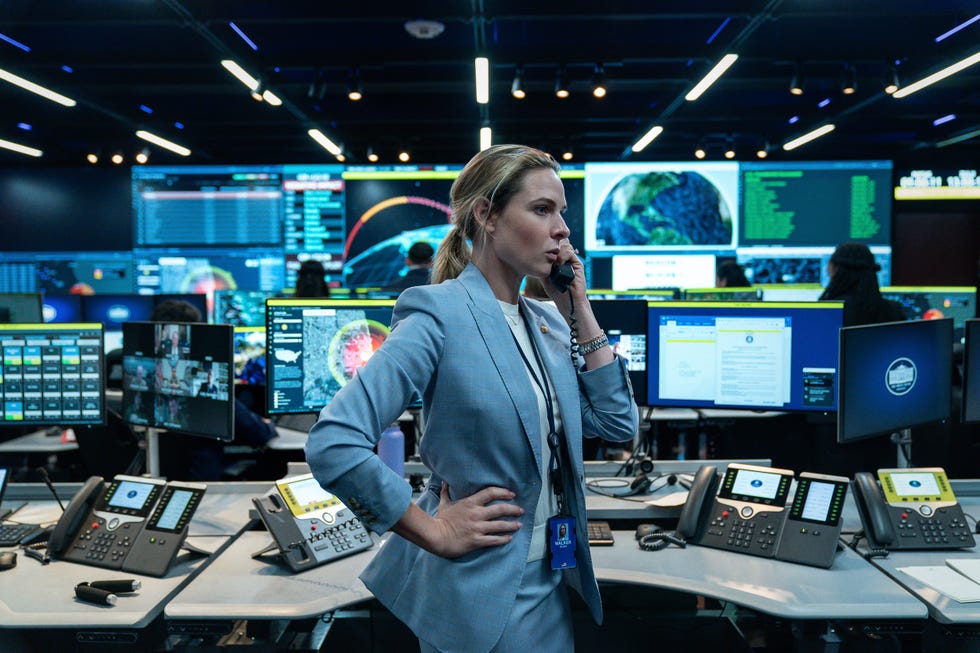A House of Dynamite remains the most-watched movie on Netflix after one week of release, and its ending has generated a lot of debate since its release. From criticism that it’s the “worst movie ending of all time” to writer Noah Oppenheim defending the ambiguous nature of it, it’s the ending that everybody wants to talk about.
It was always a viewer complaint we expected of the movie – as we pointed out in our review – but there is a reason why it was always meant to annoy you. Yes, the movie might be about what could happen when a nuclear missile is launched at the United States, yet we were never meant to see if the missile hits its target or even what the US President (Idris Elba) decides to do in response to the launch.
Annoying, no? But it’s still the right ending. Of course, not everyone is going to agree. That’s often the case for a ballsy ending of this nature, especially one so lacking in closure. And to be fair, it is frustrating to be left hanging this way – even if that was always the intention.
What to Read NextA House of Dynamite ending explained
Watching the movie, we’ve seen the same scenario play out on no less than three different occasions, all hurtling towards one cataclysmic end. When you throw a ticking clock into the mix, it’s only natural that audiences would want to know the outcome when the timer hits zero.
The problem is that there was never going to be an ending that could satisfy everyone. That’s often true when it comes to storytelling of any kind, but it’s especially true for A House of Dynamite.
If the movie ended with clear answers about who the ‘villain’ was and how America responded, it would give audiences an easy out. The story is complete, so you can go back to your normal lives. Never mind how tricky it would be to ascribe blame to one specific nation in these politically volatile times.

Netflix
Refusing to name names reinforces just how fragile this whole system is. The whole point is that anyone could be responsible for our collective doom. Who did what and why doesn’t even matter. What does matter is that there’s no right choice other than total nuclear disarmament.
By not showing the blast, or even confirming that the blast takes place, scriptwriter Noah Oppenheim is starting a conversation where we get to think about the ending we want.
Besides, good art shouldn’t satisfy everyone anyway. The ambiguity is intentional, driven to wake audiences up, forcing us to confront our political reality without any easy reassurance.
The 150,000+ Japanese people who died after America dropped nuclear bombs on Hiroshima and Nagasaki never expected such monstrosities to happen, and few actively expect to endure such horrors today either. Yet as the US President puts it, we need to be more aware that today’s situation is like being in a “house filled with dynamite” where “the walls are ready to blow, and we kept on living in it”.

Eros Hoagland/Netflix
“I grew up in an era when hiding under your school desk was considered the go-to protocol for surviving an atomic bomb,” Bigelow said in her director’s statement. “It seems absurd now – and it was – but at the time, the threat felt so immediate that such measures were taken seriously.
“Today, the danger has only escalated. Multiple nations possess enough nuclear weapons to end civilisation within minutes. And yet, there’s a kind of collective numbness – a quiet normalisation of the unthinkable. How can we call this ‘defence’ when the inevitable outcome is total destruction?
“I wanted to make a film that confronts this paradox. To explore the madness of a world that lives under the constant shadow of annihilation, yet rarely speaks of it.”
She added to the Bulletin of Atomic Scientists: “I felt like the fact that the bomb didn’t go off was an opportunity to start a conversation. With an explosion at the end, it would have been kind of all wrapped up neat, and you could point your finger [and say], ‘It’s bad that happened’.
“But it would sort of absolve us, the human race, of responsibility. And in fact, no, we are responsible for having created these weapons, and in a perfect world, getting rid of them.”
A House of Dynamite is available to watch now on Netflix.
The new edition of Living Legends is here! Buy Ariana & Witches in newsagents or online, priced at just £8.99.
After teaching in England and South Korea, David turned to writing in Germany, where he covered everything from superhero movies to the Berlin Film Festival.
In 2019, David moved to London to join Digital Spy, where he could indulge his love of comics, horror and LGBTQ+ storytelling as Deputy TV Editor, and later, as Acting TV Editor.
David has spoken on numerous LGBTQ+ panels to discuss queer representation and in 2020, he created the Rainbow Crew interview series, which celebrates LGBTQ+ talent on both sides of the camera via video content and longform reads.
Beyond that, David has interviewed all your faves, including Henry Cavill, Pedro Pascal, Olivia Colman, Patrick Stewart, Ncuti Gatwa, Jamie Dornan, Regina King, and more — not to mention countless Drag Race legends.
As a freelance entertainment journalist, David has bylines across a range of publications including Empire Online, Radio Times, INTO, Highsnobiety, Den of Geek, The Digital Fix and Sight & Sound.

